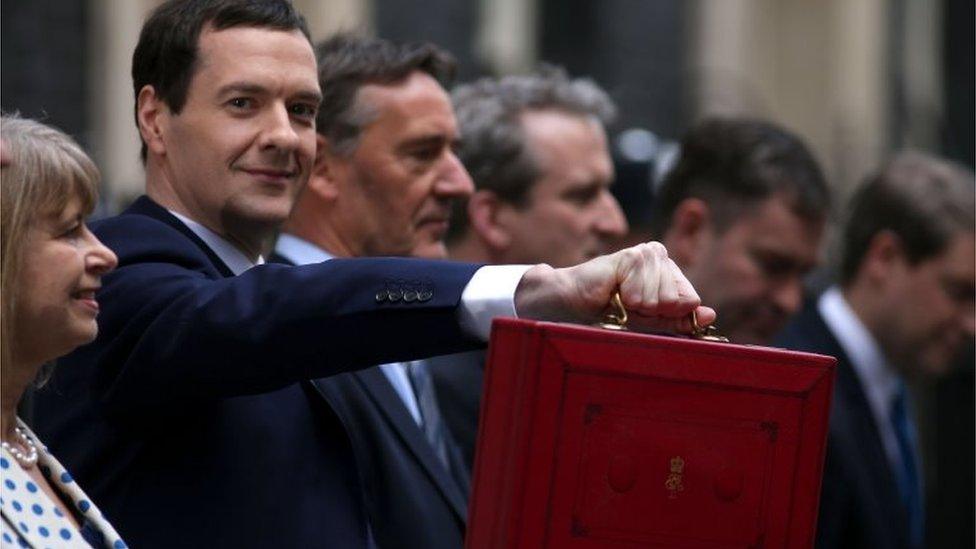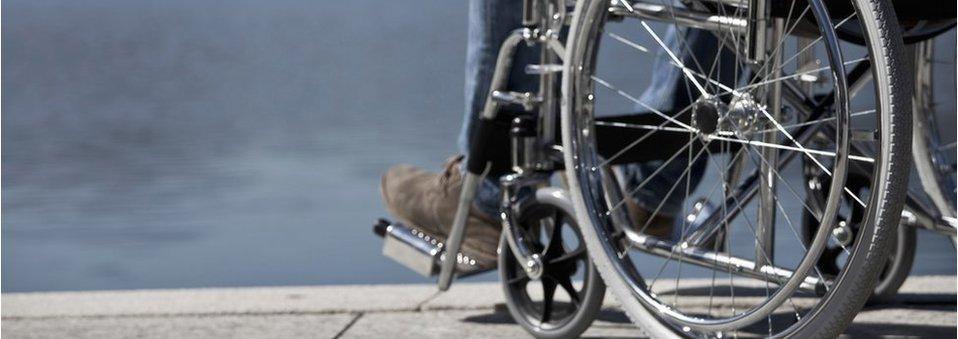Duncan Smith warns government risks 'dividing' society
- Published
Iain Duncan Smith: In his own words
Iain Duncan Smith has warned that the government risks dividing society, in his first interview since resigning as work and pensions secretary.
He attacked the "desperate search for savings" focused on benefit payments to people who "don't vote for us".
And he told the BBC's Andrew Marr his "painful" decision was "not personal" against Chancellor George Osborne.
Downing Street said it was sorry to see Iain Duncan Smith go but was determined to help "everyone in our society".
BBC political correspondent Alan Soady said Mr Duncan Smith's interview - which followed his resignation over cuts to disability benefits on Friday - was an "absolutely blistering attack".
He added: "This was not just about his objections to one change in disability benefit, he was questioning the fundamental principles underpinning the government."
'Narrow attack'
Mr Duncan Smith told the BBC he had supported a consultation on the changes to Personal Independence Payments but had come under "massive pressure" to deliver the savings ahead of last week's Budget.
The way the cuts were presented in the Budget had been "deeply unfair", he said, because they were "juxtaposed" with tax cuts for the wealthy.
He criticised the "arbitrary" decision to lower the welfare cap after the general election and suggested the government was in danger of losing "the balance of the generations", expressing his "deep concern" at a "very narrow attack on working-age benefits" while also protecting pensioner benefits.
Iain Duncan Smith: "This is not some secondary attempt to attack the prime minister"
If the focus on the working-age benefit budget continued, he said, "it just looks like we see this as a pot of money, that it doesn't matter because they don't vote for us".
Mr Duncan Smith, who said he felt he had become "semi-detached" from government, said the Conservatives had to return to being a party "that cares about even those who do not vote for us".
He said he cared "passionately" about "people who don't get the choices my children get" and "bringing people back in to an arena where we play daily but they do not".
Deteriorating relationship
He suggested the government was in "danger of drifting in a direction that divides society rather than unites it, and that, I think, is unfair".
In his interview, Mr Duncan Smith gave his version of a deteriorating relationship with the government, saying he had considered resigning last year and had "long-running" concerns about cuts imposed since May's general election.
He said the disability benefit cuts should have been part of a "much wider programme" - but after Christmas "pressure began to grow" to rush a consultation so they could feature in Wednesday's Budget.

Iain Duncan Smith said disability reforms were forced into Wednesday's Budget at short notice
Asked why he had not spoken out when the measures were presented to cabinet, he said he "sat silently" as he "realised the full state of what was happening" with tax cuts featuring elsewhere in the Budget.
After thinking "long and hard", he said he agreed to write to MPs to reassure them over the disability cuts, saying "it's not what it sounds like in the Budget".
But he said he realised in the following two days "there was no way I would able to stop this process" and resigned on Friday evening.

How the row developed

Alan Soady, BBC political correspondent
What pushes a cabinet minister to resign so sensationally?
Its origins lie partly in the rapid shift of the economic gloom-o-meter. Forecasts in December's Autumn Statement were upbeat, predicting more money rolling into the Treasury.
By Wednesday's Budget, the sunshine had turned into "storm clouds". They blew over Iain Duncan-Smith's department because welfare changes of recent years have so far brought in nothing like the savings originally projected.
IDS signed off on tightening the rules around Personal Independence Payments five days before the Budget, but now says he would rather have been allowed to wait so he could see who were the winners and losers.
As the row gathered momentum after the Budget, Education Secretary Nicky Morgan suggested the plans weren't set in stone.
Mr Duncan Smith's people disagreed, firmly believing the proposals were final. The following day, Downing Street suggested a U-turn was on the cards.
For IDS, it was the final straw, believing he was going to carry the can for a policy he claims he'd been bounced into prematurely. Others question his account - asking why he signed off the proposal in the first place if he was so against it.

Mr Duncan Smith spoke of his "love" for the Conservative Party and described claims he was trying to undermine David Cameron as "nonsense", saying he had had a "robust" conversation with the PM after telling him of his resignation.
Asked whether Mr Osborne would make a good prime minister, he added: "If he was to stand and if he was elected by the electorate, which is not just me it is everybody else, I would hope that he would."
A Number 10 spokesman said: "We are sorry to see Iain Duncan Smith go, but we are a 'one nation' government determined to continue helping everyone in our society have more security and opportunity, including the most disadvantaged.
"That means we will deliver our manifesto commitments to make the welfare system fairer, cut taxes and ensure we have a stable economy by controlling welfare spending and living within our means."
He said more people were in work under this government with fewer "trapped" on unemployment benefits.
Ministers divided
Former Lib Dem minister David Laws told Andrew Marr divisions between Mr Osborne and Mr Duncan Smith over welfare had been a "running sore throughout the last parliament".
He said: "George Osborne, I think it's fair to say, did regard the welfare budget as something of a cash cow to be squeezed in order to help to deliver deficit reduction. Iain Duncan Smith had a different view."
Mr Duncan Smith's resignation has divided his former ministerial team at the DWP.
Pensions minister Baroness Ros Altmann attacked his tenure, describing him as "exceptionally difficult" to work for, and accused him of using his resignation "to do maximum damage to the party leadership" in order to support the campaign to leave the EU.
But her fellow DWP minister Shailesh Vara said he was "surprised" at Baroness Altmann's comments, saying: "Ros's recollection does not accord with mine and I'm sorry that this has all happened."
Disabilities minister Justin Tomlinson said the former secretary of state had "always conducted himself in a professional, dedicated and determined manner", while employment minister Priti Patel told BBC Radio 5 live it had been a "privilege" to work for him.
Owen Smith, Labour's welfare spokesman, said Mr Duncan Smith had been "very honest in explaining how George Osborne could have taken different choices" and had revealed "the fundamental unfairness at the heart of government policy".